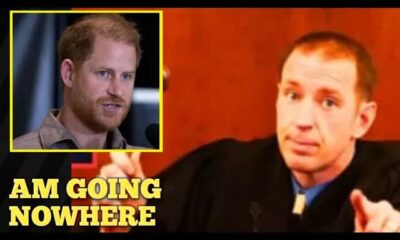The News
Prince Harry’s Virtual Appearance: A Stark Contrast to Royal Duty
In a world where royal duties are often cloaked in glamour, Prince Harry's recent virtual appearance at a NATO meeting has raised eyebrows and sparked conversations.
The Duke of Sussex, beaming from his Montecito mansion, appeared more like a corporate middle manager than a member of the British royal family.
With a wedding photo of Meghan Markle strategically placed behind him, one can't help but wonder if this was an attempt to remind everyone of his marital ties rather than focusing on the serious matters at hand.
This NATO meeting was meant to highlight the Invictus Games and honor the brave servicemen and women involved.
Instead, it felt more like a staged home office tour, where the real issues were overshadowed by Harry's backdrop choices.
It's disheartening to see such a significant event reduced to a mere photo opportunity, especially when the focus should be on the athletes and their inspiring stories.
Experts in public relations have suggested that the Sussexes' brand has become increasingly toxic, prompting them to adopt a strategy of separate appearances.
This division seems to be a desperate attempt to maintain relevance in a world that is rapidly moving on from their royal past.
Once hailed as a modernizing force within the monarchy, Harry now finds himself relegated to virtual calls, while the true spirit of the Invictus Games is carried out by others on the ground.
The irony is palpable when comparing Harry's approach to that of his brother, Prince William.
While William engages with communities, tackling homelessness and making a tangible impact, Harry remains in California, opting for video calls that lack the authenticity of face-to-face interactions.
The contrast between the two brothers couldn't be starker, highlighting the divergence in their paths since Harry stepped back from royal duties.
Adding to the absurdity is the plan to bring Harry's children, Archie and Lilibet, to the Invictus Games in Vancouver.
This move seems less about supporting veterans and more about creating a family photo opportunity.
It raises questions about whether the Sussexes can participate in events without turning them into publicity stunts.
As Harry navigates this new reality, it's hard not to reflect on how his late mother, Princess Diana, would perceive these developments.
Once a proud soldier representing his country, Harry now appears more focused on maintaining his public image than on genuine service.
Meanwhile, William continues to embody the values of compassion and commitment that Diana championed.
The decision to hold virtual meetings instead of attending in person sends a troubling message.
When did Harry become too good to show up?
He once thrived in the thick of action, but now he seems content with a carefully curated online presence.
The wedding photo in the background during a serious discussion about veterans is not just puzzling; it's downright embarrassing.
The timing of Harry's virtual appearance is telling, especially as the working royals receive positive press for their real contributions.
It seems he can't resist stepping into the spotlight whenever his brother gains attention for meaningful work.
This pattern suggests a struggle to remain relevant amidst the achievements of the current royals.
Moreover, the attempt to market the Invictus Games as a family-friendly event detracts from its true purpose.
These games are about honoring wounded veterans and celebrating their journeys, not about creating another photo op for the Sussex family.
The ongoing transformation of this noble initiative into a publicity vehicle is disappointing.
Public relations experts have pointed out how the Sussexes' efforts have become commercially unviable.
Their journey from beloved royals to figures shunned by major brands is a testament to how public perception can shift dramatically.
What was once a powerful platform for good has devolved into a series of missteps that many find hard to support.
As they grapple with their separate PR strategies, it's evident that the working royals are simply getting on with their responsibilities.
There's no need for drama or staged backgrounds—just genuine dedication to serving the public.
The disparity between Harry's virtual presence and the actual work being done by the Invictus delegation highlights the differing priorities at play.
For those who still defend Harry's actions, one must question the essence of royal service.
Is it truly represented by video calls and wedding photos, or does it lie in hands-on engagement and real-world impact?
The prince who once stood shoulder to shoulder with servicemen now seems lost in a sea of self-promotion.
As we witness this unfolding narrative, it's impossible not to feel a sense of loss for what could have been—a legacy of service and commitment overshadowed by a desperate need for relevance.
The contrast between Harry and the working royals serves as a reminder of the values that truly matter in public life.




































































